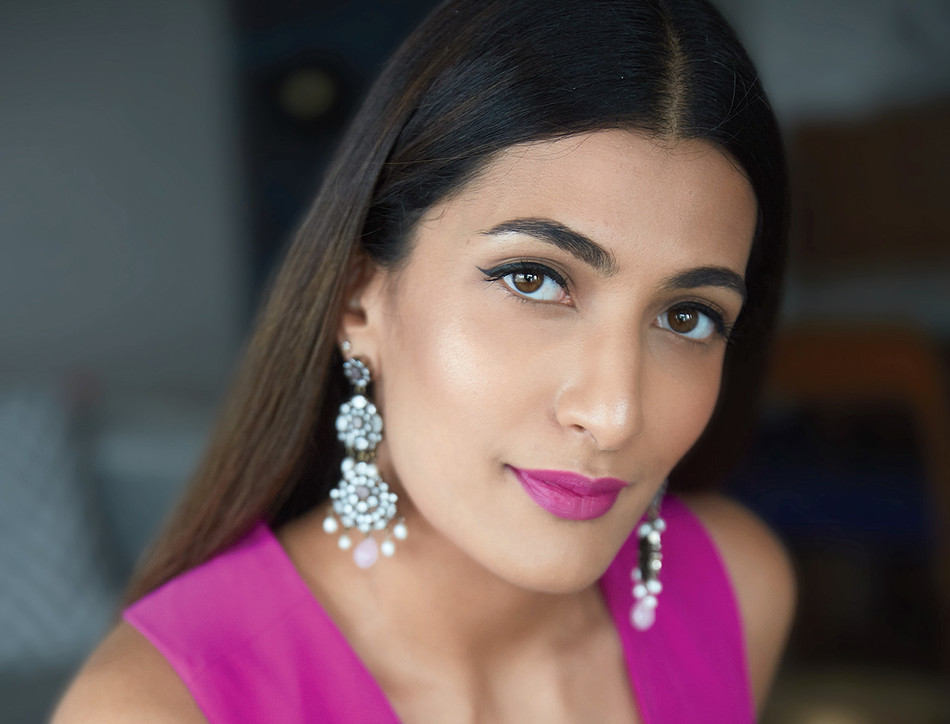“We can’t have gender equality without making female pleasure a priority,” says Leeza Mangaldas ’11CC in a video on her popular YouTube channel. From her living room in Mumbai, the trusted online sexpert is known for breaking down taboo topics that, in more socially conservative parts of India, practically no one discusses. It’s information that’s in high demand. Mangaldas now has close to a million followers on Instagram, most of them young Indians. On YouTube, her videos, which she publishes in both Hindi and English, have collectively been watched over one hundred million times.
Mangaldas began building her online presence in 2017 while working as a TV newscaster, a job she found totally uninspiring. “My career felt out of my control,” she recalls. “It got to a point where I was like, I can’t do this anymore — wear the tight dress and pretend I care about things like cars and football.”
On weekends, Mangaldas would record videos for social media and start to rack up thousands of views for her candid, informative commentary on everything from relationships and body image to periods and masturbation. Viewers of every age and gender began sending questions to her inbox. Why is my pubic region darker? Why is one of my breasts larger? “The most common question I’ve gotten is ‘Am I normal?’” says Mangaldas.
Growing up in Goa, Mangaldas was mostly shielded from the conservatism found in most of India. Popular with tourists, the small state on the country’s southwest coast is prosperous and socially liberal. In Goa, says Mangaldas, no one bats an eye if you wear a bikini, whereas in Mumbai hardly anyone wears a bathing suit in public.
As a student at Columbia, Mangaldas majored in English and visual art. She credits her classes with Gauri Viswanathan ’85TC, a professor of English and comparative literature, for helping her to better understand India’s complicated sexual politics. “The Victorian morality that colonialism embedded,” says Mangaldas, “has a root system so strong that many Indians think of it as our culture.” Despite the fact that, as Mangaldas points out, “this is the country that produced the Kama Sutra,” there is a tremendous amount of shame associated with sex.
Contraception remains taboo. “Less than 5 percent of India’s population uses condoms,” says Mangaldas, who, while working as a resident adviser in Columbia’s dorms, used to stock her floor’s lounges and bathrooms with Trojans. This isn’t because condoms aren’t available in India, explains Mangaldas. You can buy them at the drugstore, but only if you can bear the embarrassment of asking a pharmacist for them, since they keep them behind the counter.
Mangaldas’s unfiltered approach to subjects such as pleasure, consent, and sexual orientation has emerged during a decade of political and cultural change in India. In 2012, a gang rape in New Delhi drew worldwide condemnation, and the #MeToo movement has had a pronounced effect on the country. In 2018, the Supreme Court of India struck down Section 377 of the Indian Penal Code, a measure introduced by Britain in 1861 that prohibited homosexual behavior and other activities considered “against the order of nature.” “Anything other than penis-in-vagina sex between a man and a woman was technically illegal,” says Mangaldas.
By amassing so many followers on YouTube and Instagram, Mangaldas was able to quit her TV job in 2018 and start freelancing full-time as a social-media content creator. She has also formed partnerships with brands, which pay her to promote products. In December, Mangaldas launched a podcast, and later this year she will release her first book, a guide on sex and sexuality for young Indians.
No matter what forbidden subject Mangaldas explores, her lessons resonate across generations. “I once had a long conversation with a friend of my grandmother’s about oral sex,” Mangaldas says. She adds, “My favorite type of comment is when a woman writes to me saying she had her first orgasm thanks to something she learned from my videos. I feel like I’m doing God’s work.”
This article appears in the Spring/Summer 2022 print edition of Columbia Magazine with the title "A New Kind of Sex Educator."



